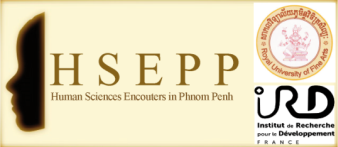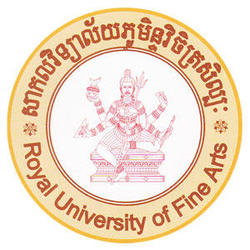Project initiators and partners
Initiators
UMI 233 trans VIH MI/INSERM U 1175
Université Royale des Beaux Arts Phnom Penh
Partners
http://sites.sas.upenn.edu/tlc/
logo tlcAgence Universitaire de la Francophonie - Bureau Asie Pacifique
HSEPP support the Manusastra Project
"Free Flow of Skilled Labor in ASEAN: a Risk for Cambodian Graduates?" By: SAM Vichet and HONG Sokha
Thursday, July 09, 2015, at 5:30 pm, At Royal University of Fine Arts’ Meeting Room, Phnom Penh
Abstract:The second decade of the 21st century is characterized by a lively debate about the future of Cambodian graduates and higher education in Cambodia after the ASEAN Economic Community (AEC) in 2015. In fact, the initial initiative of AEC 2015 is founded on a vision of a single market and production base for ASEAN member states, and the free flow of skilled labor across the region is one of the five core elements of the ASEAN integration. It was assumed that the free flow of skilled labor could make higher education in ASEAN more competitive as well as their graduates, and as a consequence, we expect an improvement on the quality of ASEAN graduates to boost the regional economy as stated by the endogenous growth theory that considers human capital as one significant contributor to economic growth.
However, in Cambodia, people are worried that the education system and the quality of Cambodian graduates, on average, are lower than other countries in the region. The competition through the free flow of skilled labor in the region is viewed by many Cambodian graduates as a threat to their futures in finding a job.
The goal of this paper is therefore to contribute to the analysis of impact of free flow of skilled labor in ASEAN on Cambodian economy, especially on Cambodian bachelor’s graduates’ employability if this free movement will lead them to face a rise of unemployment or not. By reviewing the theories of determinants of migration, conducting a tracer survey on the present employability of Cambodian bachelor’s graduates (salaries, occupations, job satisfaction, job mismatch, etc.) and gathering the opinions of employers from different reports, we don’t find that the ASEAN integration in 2015 would be a risk for Cambodian graduates. Thus, are there no any risks in the coming years? Yes, surely there are!
Actually, the greatest risk does not arise from the AEC, but from our current deficit in the system of education. While Cambodia is trying to move up the global value chain, a significant demand for high-skilled labor should be what to expect; however, the unemployment rate among university degree-holders is higher than the average. This can be the result of skills mismatch due to the imbalance of labor supply and demand as well as the poor qualification of those graduates in the fields they studied.
The disproportion of labor supply and demand does not only increase the unemployment rate in some fields but also provokes the gap in the salary. The shortage of qualified workers in Cambodia will surely limit the development of companies, the inflow of FDI; and as a result a limit of job creation; consequently a risk for increasing of unemployment rate.
To sum up, AEC 2015 is an opportunity or risk for Cambodia, mainly depending on us. Actually, if Cambodia cannot produce enough highly skilled workers to the demand of market, we will waste the opportunities from new job creations at high level which will be filled by foreign staff either they are ASEAN or European, and we may still see a limit of FDI inflow in high technology industries, thus a risk of middle income trap. Therefore, sharpening the professional, managerial generic and foreign languages skills of our graduates can help Cambodia to maximize the benefits from the integration. Certainly, the integration of ASEAN, a region of over 600 million people, could attract the inflows of FDI towards the region; therefore, this is an opportunity for Cambodia to catch in order to strengthen the capacity of production by adopting new technologies, which surely, however, demands for high skilled workers. Therefore, this reform certainly needs all Cambodians to put efforts, join hand and work together because “great things must be accomplished when all people work together for a goal”
Biodata:Sam Vichet holds a Research Master Degree in “Money Finance and Governance” from the University Lumière Lyon2 (France) in 2012. During his study in France, he was involved in several research activities, with a focus on finance and currency issues, such as: “Analysis of the correlation between inflation and stock index SBF120” and “Analysis of the impact of overconfidence on financial analysts’ behavior”.
At URCEM, he analyzed the export competiveness of Cambodia’s rubber and footwear sectors for the project “Cambodia Trade Integration Strategy” of the Ministry of Commerce in collaboration with UNDP, and later, he was responsible for the third part of the research project: “Opportunities and Risks of ASEAN 2015 for Cambodia” funded by the World Bank.








